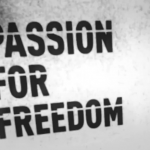Passion for Freedom – success
Posted In press 2014
We are delighted to inform you that Izabela Maciejewska, graduate of the
Vladislav Strzeminski Art Academy in Lodz has been shortlisted for the VI art
festival Passion for Freedom in London. During the festival that takes place
from the 5th to the 15th of November 2014 there was presented artwork of defiant
artists who protect freedom and human rights, and expose surrounding us
hypocrisy, obliqueness and censorship.
The most interesting pieces from 52 artists from all over the world, including
Poland, have been shortlisted for the exhibition by the judges.
This year PFF has nominated 15 movies, 10 books, 10 journalists and 52 top class
artists from all over the world (including Poland, UK, Peru, Venezuela, Iran,
Israel, Syria, Taiwan, China, South Korea, Ukraine, Germany, Belgium, the
Netherlands, France, Spain, Italy, Greece, USA and Australia). Some of the
artists are using aliases to escape oppression, some of them can’t even come to
the festival because of imprisonment or ban for leaving their home country; they
are intimidated and cannot talk to the media. The youngest artist is 18 years
old, the oldest – 64.
[..]
Interview with Passion For Freedom
Posted In press 2014
Interview with Camilla Forest, Passion For Freedom Festival Co-Funder,
It is significant that in multicultural London, Passion For Freedom Festival was
born in the circle of Polish immigrats. Can Poles teach other nations what
freedom is?
Englishmen are very cultured people. Lack of major armed conflicts with other
nations on the lands of the British Isles gave them the space needed for the
development of culture. In comparison with Englishmen, Poles throughout
centuries have differently experienced freedom, the lack of it, and the struggle
to get it back. During the partition, Poland had not existed on the map of
Europe for over a hundred years. When we finally got independence, we were
deprived of individual liberties in the time of Communism. This year Poland
celebrated the twenty-fifth anniversary of democracy. We still do remember
censorship, surveillance, curfew, martial law, terror and fear for our close
ones. Our history taught us to intuitively sense symptoms of losing freedom and
our Uhlan nature makes us inclined to sudden defensive reactions. Such
fearlessness and idealistic struggles are our national heritage. We have it in
our genes.
Have Englishmen not had such experiences?
Britons did not have a chance to feel the whip of enslavement on their own back.
This is why they differ so much from Poles. They are very much politically
correct, they act diplomatically, in their own style. I think that English and
Poles can learn from each other through cooperation. It is really fortunate that
Poles can promote freedom here in London through working at the festival with an
international group of friends. [..]
Press Nowy Folder
Posted In press 2014
The London art festival Passion For Freedom will take place from 5th to 15th November at the Embassy Tea Gallery (near Tate Modern). The festival is an exhibition of brave artists who have tried to answer three questions through
their art: What is freedom? How easy is it to lose? How hard is it to get it back?
– Which stone do you choose? – The question is posed by a young, smiling girl
welcoming a guest at the entrance to the Passion For Freedom art exhibition.
The question is both surprising and confusing. The guest needs to be asked one more
time and prompted – Choose the one you like the most.
The girl is holding a jute sack filled with stones the size of a fist. She
offers one to the guest, encouraging him with a smile. Find a place where this
stone belongs – the girl suggests. The guest begins to understand. Now he
realises that this is a game, that he is involved in a performance, and the clue
to the riddle must be found within the gallery.
He finds a pile of similar stones near one of the gallery walls. Above them
there is a tablet hanging, with a fragment of the law code of The Islamic
Republic of Iran, which says that adultery in that country is a crime. The
punishment is stoning to death.
Iranian law clearly specifies the size of the stone that can be used as a tool
to inflict the death penalty. It cannot be too big, as the idea is not to kill a
convict at the first or second hit; however, it cannot be too small to be called
a stone. The guest realizes that the particular stone he is holding in his hand
would be a perfect weapon to perform an execution. [..]

















